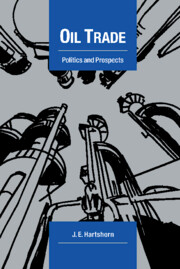Book contents
- Frontmatter
- Contents
- List of figures
- List of tables
- List of tabular boxes
- Preface
- List of abbreviations
- 1 Pause or plateau?
- 2 A discontinuity in trade
- 3 Cost: concepts and comparisons
- 4 Ambitions of autarky?
- 5 Still the prime mover
- 6 An industry restructured
- 7 Governments in the oil business
- 8 The Opec performance
- 9 A confusion of prices
- 10 Perspectives of supply
- 11 A contrast of expectations
- 12 A sustainable paradox?
- Appendix 1 What are oil reserves?
- Appendix 2 A note on energy and oil statistics
- Bibliography
- Index
4 - Ambitions of autarky?
Published online by Cambridge University Press: 27 January 2010
- Frontmatter
- Contents
- List of figures
- List of tables
- List of tabular boxes
- Preface
- List of abbreviations
- 1 Pause or plateau?
- 2 A discontinuity in trade
- 3 Cost: concepts and comparisons
- 4 Ambitions of autarky?
- 5 Still the prime mover
- 6 An industry restructured
- 7 Governments in the oil business
- 8 The Opec performance
- 9 A confusion of prices
- 10 Perspectives of supply
- 11 A contrast of expectations
- 12 A sustainable paradox?
- Appendix 1 What are oil reserves?
- Appendix 2 A note on energy and oil statistics
- Bibliography
- Index
Summary
In the early seventies, when development of the first few oilfields discovered in the North Sea had only recently begun, one was sometimes asked by friends in Middle East governments whether its production would need to be subsidised.
It was a fair question. Oil produced close to the heart of the world's largest oil-importing region would obviously enjoy a very large transport advantage over crudes usually moving some 11,000 miles around the Cape to reach north-west Europe; and at that time transport costs were representing close on a third of the landed price of Middle East crude. But against that, ‘frontier exploration’ in the North Sea and the development planned to exploit commercial discoveries had to be conducted almost beyond the limits of existing offshore technology. Every company was on a learning curve. From the Gulf, producing with operating costs of a few cents a barrel and able to add capacity for about $100–150/db of extra production, it was hard to believe such operations could be commercially worth while.
At the time a barrel of Gulf crude was being landed in Western Europe at a price of about $2.50 a barrel (after taxes and royalties of about $1.35). The largest and first British field to be developed, BP's Forties, was due to come into production by mid–1975.
- Type
- Chapter
- Information
- Oil TradePolitics and Prospects, pp. 76 - 92Publisher: Cambridge University PressPrint publication year: 1993



